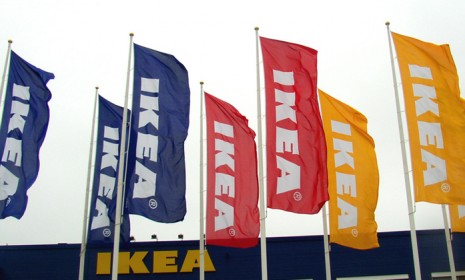Did Ikea use political prisoners to make its furniture?
New reports say the Swedish company used jailed dissidents in East Germany and Cuba for labor, exposing Ikea's alleged ties to brutal totalitarian regimes

Ikea is famous for its Billy bookcases, idiosyncratic instruction manuals, and meatballs, but it might soon earn a reputation for something much less innocent. New reports have emerged saying that the Swedish furniture giant once had commercial ties with the communist regimes in East Germany and Cuba, and even used political prisoners in those countries as a source of free labor. The allegations threaten to upend Ikea's squeaky-clean image, and could make customers think twice about shopping at its stores. Here, a guide to the controversy:
Who is making these accusations?
Sweden's SVT, a public television station, asserts that in the 1970s and 1980s Ikea used political prisoners in East Germany as a source of free labor. German newspaper Frankfurter Allgemeine Zeitung says that in the 1980s Ikea also forced jailed dissidents in Cuba to make furniture. Both reports are based on unearthed files that had been kept by the Stasi, the notorious secret police group that suppressed East German citizens before the fall of the Berlin Wall in 1989.
The Week
Escape your echo chamber. Get the facts behind the news, plus analysis from multiple perspectives.

Sign up for The Week's Free Newsletters
From our morning news briefing to a weekly Good News Newsletter, get the best of The Week delivered directly to your inbox.
From our morning news briefing to a weekly Good News Newsletter, get the best of The Week delivered directly to your inbox.
So Ikea worked with the Stasi?
The Swedish television report indicates that Ikea "worked hand in hand" with the Stasi to make use of "scores of political prisoners," says Tony Paterson at Britain's The Independent. It's not the first time that Ikea's East German connections have come to the surface. A German documentary in 2011 identified one Ikea factory in the town of Waldheim that used prisoners from a nearby jail. The factory was famous for producing Ikea's "Klippan" sofa, which is still sold today and unbiquitous in living rooms. "That certainly makes the thought of buying one — or even sitting on one — significantly less appealing," says Cassie Murdoch at Jezebel.
How did Cuba come into the picture?
Ikea reportedly linked up with Fidel Castro's government in 1987 through Cuba's trade connections with East Germany. Ikea and Cuba signed a contract that would see the state-owned company Emiat produce 35,000 dining tables, 10,000 children's tables, and 4,000 three-piece suites. The production centers were "incorporated in the Interior Ministry's prison facilities," where opponents of the Castro regime were kept.
A free daily email with the biggest news stories of the day – and the best features from TheWeek.com
Has Ikea responded?
Ikea is conducting an investigation into the incident, and "interviewing people at Ikea who were around back then," says company official Jeanette Skjelmose. "So far there are no indications that we would have asked that prisoners be used in manufacturing," she says. "What we're looking into now is whether it could have happened anyway, without our knowledge."
Sources: Daily Mail, Fox News, The Guardian, The Huffington Post, The Independent, Jezebel
-
 Political cartoons for January 24
Political cartoons for January 24Cartoons Saturday's political cartoons include 3D chess, political distractions, and more
-
 Ryanair/SpaceX: could Musk really buy the airline?
Ryanair/SpaceX: could Musk really buy the airline?Talking Point Irish budget carrier has become embroiled in unlikely feud with the world’s wealthiest man
-
 Claudette Colvin: teenage activist who paved the way for Rosa Parks
Claudette Colvin: teenage activist who paved the way for Rosa ParksIn The Spotlight Inspired by the example of 19th century abolitionists, 15-year-old Colvin refused to give up her seat on an Alabama bus